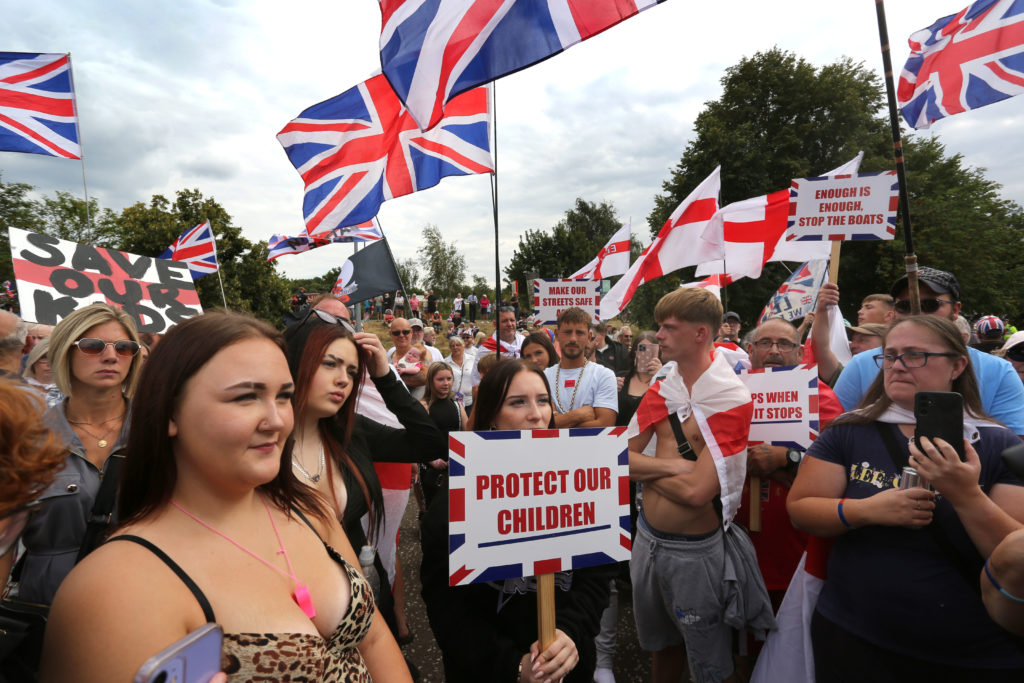THE sight of mobs baying outside hotels containing asylum seekers.
The same mobs usurping the union jack and parading it around the country, and using the St George’s Flag in the same way.
Has Britain become racist?
It seems a reasonable question to ask.
Political leaders who really should know better appear to be urging on the mob. The Labour government has been utterly spineless in its response.
 Protesters demonstrate against an asylum hotel in Norwich in August 2025 (Pic: Getty)
Protesters demonstrate against an asylum hotel in Norwich in August 2025 (Pic: Getty)The leaders of Reform UK and the Conservative Party have urged councils to challenge the right to hold asylum seekers in hotels.
The government is committed to shutting the hotels as part of a process aimed at clearing up an asylum mess left by the previous Conservative administration.
But Labour has not stood up for the right to claim asylum in the UK. Instead, it has fudged the issue, not challenging Reform.
Irish people know well that side of British discrimination from the early days of immigration here, particularly from the mid-20th century.
The Irish suffered further racism when the conflict in the North of Ireland broke out. This saw anti-Irish sentiment rise in Britain. That was institutionalised by the state with the Prevention of Terrorism Act and its implementation.
The prevalence of anti-Irish racism faded with the end of the Troubles and the replacement of one ‘suspect’ community with another. So, for Irish, read Muslims. Another inglorious period of racism ensued, this time against Muslims, with the war on terror and all that entailed.
There was a period between the 1970s and 1990s when there did seem to be more tolerance towards some minorities. The Irish won ethnic minority status. Anti-racist legislation helped, multiculturalism thrived. But there was always that nagging doubt that racism never went away but just became more covert.
At the turn of the century, there was a rude awakening with the murder of Black teenager Stephen Lawrence. The Macpherson inquiry laid bare how many of its institutions, including the police, were institutionally racist.
A list of 75 recommendations followed, many of which were implemented.
Wind forward to the last 10 years. There has been a steady erosion of the plural liberal consensus that embraced tolerance and multiculturalism. So, there were the attacks on political correctness and so-called “wokeism”. The high-water mark for these reactionaries came with Brexit.
A decision made largely on the back of hysteria stirred up by the right, against foreigners generally. So the damage done to people’s cost of living, caused by the banking crisis and subsequent austerity policies of Conservative governments, was put at the door of migrants and Europe.
The electorate swallowed it – Britain voted to leave the EU, the biggest act of self-harm in the post-war era.
So, Britain limped on, with a number of Conservative governments led by increasingly inept leaders. Meanwhile, the main architect of Brexit, Farage, re-emerges as the champion of working people. The political playbook used in America by Donald Trump is now fully deployed here.
The Labour government seems reluctant to stand up for liberal humanitarian principles. Compare the way Keir Starmer responded to the riots last summer, declaring racism would not be tolerated, to today when he appears to flirt with Reform’s wild deportation talk.
The far right is on the march across the world – in Britain and Europe, as well as America. Hope comes from those who have stood up against its advance: the people who have stood in solidarity with frightened asylum seekers in hotels, the many who came out last year in defiance of the racist mob rampaging across the country, declaring “enough”.
This often silent majority needs to find its voice more often. Passivity will see the racists triumph. The tolerant majority also needs a political outlet – the present mainstream political parties for the most part are tipping towards Reform-lite.
So, in answer to the original question: no, Britain is not fundamentally racist. But what is certain is that sitting in silence isn’t an option for the majority of people who are not racist.

